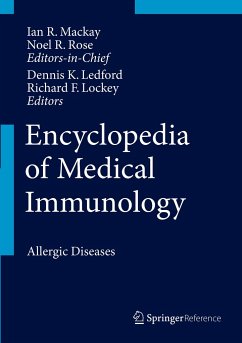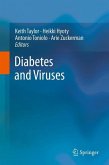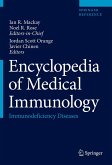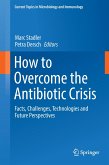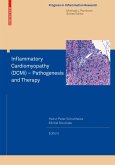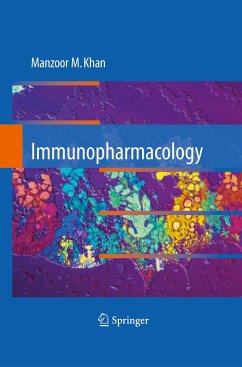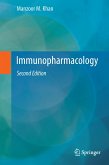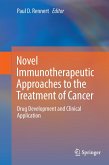Encyclopedia of Medical Immunology
Allergic Diseases
Herausgegeben:Mackay, Ian R.; Rose, Noel R.; Ledford, Dennis K.; Lockey, Richard F.
Encyclopedia of Medical Immunology
Allergic Diseases
Herausgegeben:Mackay, Ian R.; Rose, Noel R.; Ledford, Dennis K.; Lockey, Richard F.
- Gebundenes Buch
- Merkliste
- Auf die Merkliste
- Bewerten Bewerten
- Teilen
- Produkt teilen
- Produkterinnerung
- Produkterinnerung
Volume Allergic Diseases is a comprehensive, multi-authored reference work, offering a broad appeal to microbiologists, immunologists, and infectious disease specialists. The volume explores all aspects of allergic diseases, body systems and vaccines. Emphasis is placed on genetics, physiology, metabolism, pathogenesis, and applied microbiology. Under the leadership of some of the most world renowned names in the field, the encyclopedia brings together an outstanding collection of contributions by top scientists in a variety of fields.
The entries are listed alphabetically and provide full…mehr
Andere Kunden interessierten sich auch für
![Diabetes and Viruses Diabetes and Viruses]() Diabetes and Viruses112,99 €
Diabetes and Viruses112,99 €![Encyclopedia of Medical Immunology Encyclopedia of Medical Immunology]() Encyclopedia of Medical Immunology335,99 €
Encyclopedia of Medical Immunology335,99 €![How to Overcome the Antibiotic Crisis How to Overcome the Antibiotic Crisis]() How to Overcome the Antibiotic Crisis127,99 €
How to Overcome the Antibiotic Crisis127,99 €![Inflammatory Cardiomyopathy (DCMi) - Pathogenesis and Therapy Inflammatory Cardiomyopathy (DCMi) - Pathogenesis and Therapy]() Inflammatory Cardiomyopathy (DCMi) - Pathogenesis and Therapy246,09 €
Inflammatory Cardiomyopathy (DCMi) - Pathogenesis and Therapy246,09 €![Immunopharmacology Immunopharmacology]() Manzoor M. KhanImmunopharmacology49,99 €
Manzoor M. KhanImmunopharmacology49,99 €![Immunopharmacology Immunopharmacology]() Manzoor M. KhanImmunopharmacology149,99 €
Manzoor M. KhanImmunopharmacology149,99 €![Novel Immunotherapeutic Approaches to the Treatment of Cancer Novel Immunotherapeutic Approaches to the Treatment of Cancer]() Novel Immunotherapeutic Approaches to the Treatment of Cancer112,99 €
Novel Immunotherapeutic Approaches to the Treatment of Cancer112,99 €-
-
-
Volume Allergic Diseases is a comprehensive, multi-authored reference work, offering a broad appeal to microbiologists, immunologists, and infectious disease specialists. The volume explores all aspects of allergic diseases, body systems and vaccines. Emphasis is placed on genetics, physiology, metabolism, pathogenesis, and applied microbiology. Under the leadership of some of the most world renowned names in the field, the encyclopedia brings together an outstanding collection of contributions by top scientists in a variety of fields.
The entries are listed alphabetically and provide full references.
The volume covers the following topics:
- Food Allergy and gastrointestinal Allergic Diseases
- Insect Allergy
- Allergy Diagnosis and Testing
- Allergy Treatment: Pharmacotherapy
- Asthma and Other Allergic Lower Respiratory Disease
- Biology of IgE, Mast Cells and Eosinophils
- Specific Allergens Causing Human Disease
- Atopic Dermatitis, Urticaria and Dermatologic Allergy
- Allergy Treatment: Immunotherapy, Immunomodulator Therapy and Allergen Avoidance
The entries are listed alphabetically and provide full references.
The volume covers the following topics:
- Food Allergy and gastrointestinal Allergic Diseases
- Insect Allergy
- Allergy Diagnosis and Testing
- Allergy Treatment: Pharmacotherapy
- Asthma and Other Allergic Lower Respiratory Disease
- Biology of IgE, Mast Cells and Eosinophils
- Specific Allergens Causing Human Disease
- Atopic Dermatitis, Urticaria and Dermatologic Allergy
- Allergy Treatment: Immunotherapy, Immunomodulator Therapy and Allergen Avoidance
Produktdetails
- Produktdetails
- Verlag: Springer / Springer New York / Springer, Berlin
- Artikelnr. des Verlages: 86289930, 978-1-4614-9193-4
- 2014
- Seitenzahl: 716
- Erscheinungstermin: 11. August 2014
- Englisch
- Abmessung: 260mm x 183mm x 44mm
- Gewicht: 1450g
- ISBN-13: 9781461491934
- ISBN-10: 1461491932
- Artikelnr.: 39301427
- Herstellerkennzeichnung
- Springer-Verlag GmbH
- Tiergartenstr. 17
- 69121 Heidelberg
- ProductSafety@springernature.com
- Verlag: Springer / Springer New York / Springer, Berlin
- Artikelnr. des Verlages: 86289930, 978-1-4614-9193-4
- 2014
- Seitenzahl: 716
- Erscheinungstermin: 11. August 2014
- Englisch
- Abmessung: 260mm x 183mm x 44mm
- Gewicht: 1450g
- ISBN-13: 9781461491934
- ISBN-10: 1461491932
- Artikelnr.: 39301427
- Herstellerkennzeichnung
- Springer-Verlag GmbH
- Tiergartenstr. 17
- 69121 Heidelberg
- ProductSafety@springernature.com
Professor Ian Mackay is an Honorary Professional Research Fellow of Monash University, Australia, and member of the Department of Biochemistry and Molecular Biology. In a career spanning over six decades, with over 700 publications, Professor Mackay has gained international recognition as a pioneer in the area of autoimmunity; with his research contributing to the development of immunosuppressive treatment for autoimmune diseases. In recognition of his service to medical research, Prof. Mackay was included in the 1981 Australia Day Honours list and was appointed as a Member of the Order of Australia. In 2001 he was awarded the Centenary Medal for service to Australian society and science in biochemistry and molecular biology. Dr. Rose is the Director of Center for Autoimmune Disease Research and a Professor in the Department of Pathology (with joint appointment in Department of Medicine), the Johns Hopkins University School of Medicine and a Professor in the W. Henry Feinstone Department of Molecular Microbiology and Immunology, the Johns Hopkins University Bloomberg School of Public Health. Dr. Rose also served as the Chairman of the Autoimmune Diseases Coordinating Committee of the National Institutes of Health and a principal advisor to the former U.S. NIH Director Dr. Elias A. Zerhouni. He was the Chairman of the W. Henry Feinstone Department of Molecular Microbiology and Immunology of the Johns Hopkins University Bloomberg School of Public Health for more than a decade. Dr. Rose's pioneering studies on autoimmune thyroiditis and myocarditis helped to initiate the modern era of research on autoimmune diseases. Dr. Rose and his colleagues have continued to contribute to our understanding of autoimmunity, including the first demonstration of the genetic factors responsible for predisposition to autoimmune disease in animals and more recent investigations on the influence of infection and environmental agents in the initiation of autoimmune disease ingenetically predisposed animals. Dr. Rose is the co-author of the textbook The Autoimmune Diseases (now 3rd edition) and former Editor-in-Chief of Clinical Immunology. He is currently the Editor-in-Chief of The Year in Immunology.
Allergy Treatment: Immunotherapy, Immu: Allergen avoidance: Avoidance strategies for Skin allergies.- Allergen avoidance: Cockroach and rodent avoidance.- Allergen avoidance: Dietary management of food allergy.- Allergen avoidance: Dust mite avoidance.- Allergen avoidance: Fungi and mold avoidance.- Allergen avoidance: Furry animal avoidance.- Allergen avoidance: Pollen avoidance-tree, grass, weed.- Allergen Immunotherapy: Immunotherapy for Allergic Rhinitis.- Allergen Immunotherapy: Immunotherapy for Asthma.- Allergen Immunotherapy: Immunotherapy for Hymenoptera allergy.- Allergen Immunotherapy: Immunotherapy with recombinant and DNA conjugated allergens.- Allergen Immunotherapy: Mechanisms of IT.- Allergen Immunotherapy: Overview of allergen immunotherapy.- Allergen Immunotherapy: Safety of Immunotherapy.- Allergen Immunotherapy: Sublingual Immunotherapy.- Immunomodulator therapy: Immunomodulator treatment of Asthma.- Immunomodulator therapy: Immunomodulatory treatment of Chronic urticarial.- Immunomodulator therapy: Immunomodulatory treatment of hypereosinophilic syndrome.- Immunomodulator therapy: Immunomodulatory treatment of Mastocytosis.- Allergy Treatment: Pharmacotherapy: Herbal remedies.- Homeopathy, acupuncture, NAET.- Intranasal anticholinergics.- Intranasal antihistamines.- Intranasal Corticosteroids.- Intranasal decongestants.- Intranasal mast cell stabilizers.- Leukotriene receptor antagonists.- mAbs (omalizumab).- Ocular antihistamines.- Ocular Corticosteroids.- Ocular vasoconstrictors.- Oral antihistamines.- Oral corticosteroids.- Oral decongestants.- Oral mast cell stabilizers.- Topical calcineurin inhibitors.- Topical corticosteroids.- Topical Preparations: Antihistamines.- Atopic Dermatitis Urticaria and Dermatitis: 3-dimethylaminopropylamine (DMAPA), allergic contact dermatitis to.- Articaine allergic reaction.- Contact urticaria/protein contact dermatitis (to asparagus, cow?s hair, seafood etc.).- Cutaneousdrug reaction.- Dermatitis from 2-N-octyl-4-isothiazolin-3-one, allergic contact.- Dermatitis, allergic contact.- Dermatitis, atopic.- Eyes and eyelid, contact allergic reactions on.- Fingernails from sensitization to acrylic, loss of.- Fragrancy, allergic contact dermatitis.- Gluten intolerance and skin diseases.- Hairdressers occupational skin disease.- Latex allergen sensitization.- Methyldibromo glutaronitrile, contact allergy to.- Nail contact dermatitis including allergic contact dermatitis due to nail cosmetics.- NethertonâEUR(TM)s syndrome.- Nickel allergic contact dermatitis.- Nitroglycerin dermatitis.- Peanut urticarial.- Photoallergic contact dermatitis.- Plants, allergic contact dermatitis from.- Polidocanol: a contact allergen in shampoo.- Titanium alloy, dermatitis (allergic contact/ granulomatous).- Urticaria.- Biology of IgE, Mast cells and Eosinophils: Activating and inhibitory receptors of mast cells.- Eosinophil activation.- Eosinophil Historical Background.- Eosinophil mediators (granule proteins).- Eosinophil morphology
.- Eosinophil progenitors, growth and differentiation.- Eosinophil receptor expression
.- Eosinophil recruitment
.- Genetic regulation of IgE.- Hyper eosinophilic syndrome.- Hyper IgE syndrome.- IgE isotype switching.- IgE receptor.- IgE testing.- Induction of IgE synthesis; cellular interactions and molecular events.- Mast cell growth and development.- Mast cell-derived mediators.- Mastocytosis.- Morphology and histologic identification of mast cells.- Role of eosinophils in disease.- Role of IgE in disease.- Role of mast cells in disease.- Specific IgE.- Food Allergy and Gastrointestinal Allergy: Allergic Proctocolitis and FPIES.- Cow's milk allergy.- Delayed anaphylaxis to mammalian meat (Alpha-gal).- Diagnostic testing for food allergies.- Egg allergy.- Eosinophilic Gastrointestinal disorders.- Epidemiology of Food allergy.- Esophagitis, eosinophilic.- Fatal allergic reactions tofood.- Food allergens.- Food allergies.- Food challenge.- Food Desensitization.- Future treatment for food allergies.- Nutrition in food allergy.- Oral allergy syndrome.- Peanut allergy.- Insect Allergy: Biting Insects (Local and Systemic Reactions),- Honey Bee.- Imported Fire Ant Allergy.- Insect Allergy in Children.- Venom Content.- Wasp and Vespid Allergy.- Specific Allergens Causing Human Disease: Acrylate allergy.- Allergy to topical medicines.- Benzalkonium chloride in antiseptic bath oil, contact dermatitis to.- Citral in lip salve, contact allergy to.- Contact allergy due to exposure to cosmetics.- Contact allergy due to exposure to detergents and soaps.- Contact allergy due to exposure to dyes.- Corn contact urticarial.- Dicaprylyl maleate âEUR" an emerging cosmetic allergen.- Etiological agents of contact allergies.- Footwear dermatitis, allergens in.- Formaldehyde allergy.- Hair dressing allergens.- Herbs, contact sensitivity to medicinal.- Kumkum-induced dermatitis.- Majantol, a fragrance allergen.- Metal contact allergy.- Methacrylates, airborne allergic contact dermatitis from.- Methyldibromo Glutaronitrile, Allergic contact dermatitis from hand degreasing toilet paper.- Nickel, allergic contact sensitization to.- Occupational asthma, isocyanates.- Parthenium dermatitis.- Patch testing.- Rubber/latex allergy.- Shoe allergens.- Shoe allergens, groups of.- Tea tree oil, allergy to.- Woods causing lymphomatoid contact dermatitis, exotic.- Allergy Diagnosis and Testing: Analytes and Biomarkers: IgE.- Analytes and Biomarkers: Cotinine.- Analytes and Biomarkers: Environmental Allergen Assessment.- Analytes and Biomarkers: NO2 and Asthma.- Analytes and Biomarkers: Precipitin Antibodies.- Assay Performance Parameters.- Diagnostic Assay Components.- Diagnostic Components: T helper cell cytokines.- Diagnostic Components: Allergen (in vivo [skin testing, immunotherapy] and in vitro] âEUR"Potency, Diagnostic Components: Basophils.-Diagnostic Components: Dendritic cells.- Diagnostic Components: IgE secreting Plasma Cells.- Diagnostic Components: Mast Cells (Fc-epsilon R1).- Diagnostic Terms: Atopy.- Diagnostic Terms:Point of Care testing.- Laboratory and Assay Evaluation.- Methods (in vitro and in vivo): Multiplex Immunoassay Systems (ISAC, Luminex).- Methods (in vitro and in vivo):NEPHELOMETRY.- Methods (in vitro and in vivo): Single-plex Immunoassay Autoanalyzers.- Methods (in vivo): Methacholine Challenge.- Methods (in vivo): Provocation Tests: ( Food Challenge, Nasal Challenge, Bronchial Challenge).- Methods (in vivo):Skin Test (intradermal, puncture).- Predictive value theory of laboratory tests.- Asthma and Other Allergic Lower Respiratory D: Asthma variants: ABPA.- Asthma variants: AERD.- Asthma variants: Allergic Asthma.- Asthma variants: Cough-variant asthma.- Diseases in DDx of asthma: COPD.- Diseases in DDx of asthma: Diff dx of asthma.- Diseases in DDx of asthma: Idiopathic Acute Eosinophilic Pneumonia.- Diseases in DDx of asthma: TBM/HDAC.- Diseases in DDx of asthma: Vocal Cord Dysfunction.- Diseases in DDx of asthma:alpha 1 AT deficiency.- Diseases in DDx of asthma:Autoimmune lung disease.- Diseases in DDx of asthma:BPD.- Diseases in DDx of asthma: bronchiectasis.- Diseases in DDx of asthma:chronic eos PNA.- Diseases in DDx of asthma: Croup.- Diseases in DDx of asthma:eos bronchitis.- Diseases in DDx of asthma:HSP.- Diseases in DDx of asthma:IPF.- Diseases in DDx of asthma:Microscopic PAN.- Testing: Bronchial challenges.- Testing: Sputum eosinophil count.- Testing: DLCO.- Testing:Exercise challenge.- Testing:Exhaled nitric oxide.- Testing: High resolution chest CT scan.- Testing: Mannitol challenge.- Testing: Methacholine challenge.- Testing: PFTs.
Allergy Treatment: Immunotherapy, Immu: Allergen avoidance: Avoidance strategies for Skin allergies.- Allergen avoidance: Cockroach and rodent avoidance.- Allergen avoidance: Dietary management of food allergy.- Allergen avoidance: Dust mite avoidance.- Allergen avoidance: Fungi and mold avoidance.- Allergen avoidance: Furry animal avoidance.- Allergen avoidance: Pollen avoidance-tree, grass, weed.- Allergen Immunotherapy: Immunotherapy for Allergic Rhinitis.- Allergen Immunotherapy: Immunotherapy for Asthma.- Allergen Immunotherapy: Immunotherapy for Hymenoptera allergy.- Allergen Immunotherapy: Immunotherapy with recombinant and DNA conjugated allergens.- Allergen Immunotherapy: Mechanisms of IT.- Allergen Immunotherapy: Overview of allergen immunotherapy.- Allergen Immunotherapy: Safety of Immunotherapy.- Allergen Immunotherapy: Sublingual Immunotherapy.- Immunomodulator therapy: Immunomodulator treatment of Asthma.- Immunomodulator therapy: Immunomodulatory treatment of Chronic urticarial.- Immunomodulator therapy: Immunomodulatory treatment of hypereosinophilic syndrome.- Immunomodulator therapy: Immunomodulatory treatment of Mastocytosis.- Allergy Treatment: Pharmacotherapy: Herbal remedies.- Homeopathy, acupuncture, NAET.- Intranasal anticholinergics.- Intranasal antihistamines.- Intranasal Corticosteroids.- Intranasal decongestants.- Intranasal mast cell stabilizers.- Leukotriene receptor antagonists.- mAbs (omalizumab).- Ocular antihistamines.- Ocular Corticosteroids.- Ocular vasoconstrictors.- Oral antihistamines.- Oral corticosteroids.- Oral decongestants.- Oral mast cell stabilizers.- Topical calcineurin inhibitors.- Topical corticosteroids.- Topical Preparations: Antihistamines.- Atopic Dermatitis Urticaria and Dermatitis: 3-dimethylaminopropylamine (DMAPA), allergic contact dermatitis to.- Articaine allergic reaction.- Contact urticaria/protein contact dermatitis (to asparagus, cow?s hair, seafood etc.).- Cutaneousdrug reaction.- Dermatitis from 2-N-octyl-4-isothiazolin-3-one, allergic contact.- Dermatitis, allergic contact.- Dermatitis, atopic.- Eyes and eyelid, contact allergic reactions on.- Fingernails from sensitization to acrylic, loss of.- Fragrancy, allergic contact dermatitis.- Gluten intolerance and skin diseases.- Hairdressers occupational skin disease.- Latex allergen sensitization.- Methyldibromo glutaronitrile, contact allergy to.- Nail contact dermatitis including allergic contact dermatitis due to nail cosmetics.- NethertonâEUR(TM)s syndrome.- Nickel allergic contact dermatitis.- Nitroglycerin dermatitis.- Peanut urticarial.- Photoallergic contact dermatitis.- Plants, allergic contact dermatitis from.- Polidocanol: a contact allergen in shampoo.- Titanium alloy, dermatitis (allergic contact/ granulomatous).- Urticaria.- Biology of IgE, Mast cells and Eosinophils: Activating and inhibitory receptors of mast cells.- Eosinophil activation.- Eosinophil Historical Background.- Eosinophil mediators (granule proteins).- Eosinophil morphology
.- Eosinophil progenitors, growth and differentiation.- Eosinophil receptor expression
.- Eosinophil recruitment
.- Genetic regulation of IgE.- Hyper eosinophilic syndrome.- Hyper IgE syndrome.- IgE isotype switching.- IgE receptor.- IgE testing.- Induction of IgE synthesis; cellular interactions and molecular events.- Mast cell growth and development.- Mast cell-derived mediators.- Mastocytosis.- Morphology and histologic identification of mast cells.- Role of eosinophils in disease.- Role of IgE in disease.- Role of mast cells in disease.- Specific IgE.- Food Allergy and Gastrointestinal Allergy: Allergic Proctocolitis and FPIES.- Cow's milk allergy.- Delayed anaphylaxis to mammalian meat (Alpha-gal).- Diagnostic testing for food allergies.- Egg allergy.- Eosinophilic Gastrointestinal disorders.- Epidemiology of Food allergy.- Esophagitis, eosinophilic.- Fatal allergic reactions tofood.- Food allergens.- Food allergies.- Food challenge.- Food Desensitization.- Future treatment for food allergies.- Nutrition in food allergy.- Oral allergy syndrome.- Peanut allergy.- Insect Allergy: Biting Insects (Local and Systemic Reactions),- Honey Bee.- Imported Fire Ant Allergy.- Insect Allergy in Children.- Venom Content.- Wasp and Vespid Allergy.- Specific Allergens Causing Human Disease: Acrylate allergy.- Allergy to topical medicines.- Benzalkonium chloride in antiseptic bath oil, contact dermatitis to.- Citral in lip salve, contact allergy to.- Contact allergy due to exposure to cosmetics.- Contact allergy due to exposure to detergents and soaps.- Contact allergy due to exposure to dyes.- Corn contact urticarial.- Dicaprylyl maleate âEUR" an emerging cosmetic allergen.- Etiological agents of contact allergies.- Footwear dermatitis, allergens in.- Formaldehyde allergy.- Hair dressing allergens.- Herbs, contact sensitivity to medicinal.- Kumkum-induced dermatitis.- Majantol, a fragrance allergen.- Metal contact allergy.- Methacrylates, airborne allergic contact dermatitis from.- Methyldibromo Glutaronitrile, Allergic contact dermatitis from hand degreasing toilet paper.- Nickel, allergic contact sensitization to.- Occupational asthma, isocyanates.- Parthenium dermatitis.- Patch testing.- Rubber/latex allergy.- Shoe allergens.- Shoe allergens, groups of.- Tea tree oil, allergy to.- Woods causing lymphomatoid contact dermatitis, exotic.- Allergy Diagnosis and Testing: Analytes and Biomarkers: IgE.- Analytes and Biomarkers: Cotinine.- Analytes and Biomarkers: Environmental Allergen Assessment.- Analytes and Biomarkers: NO2 and Asthma.- Analytes and Biomarkers: Precipitin Antibodies.- Assay Performance Parameters.- Diagnostic Assay Components.- Diagnostic Components: T helper cell cytokines.- Diagnostic Components: Allergen (in vivo [skin testing, immunotherapy] and in vitro] âEUR"Potency, Diagnostic Components: Basophils.-Diagnostic Components: Dendritic cells.- Diagnostic Components: IgE secreting Plasma Cells.- Diagnostic Components: Mast Cells (Fc-epsilon R1).- Diagnostic Terms: Atopy.- Diagnostic Terms:Point of Care testing.- Laboratory and Assay Evaluation.- Methods (in vitro and in vivo): Multiplex Immunoassay Systems (ISAC, Luminex).- Methods (in vitro and in vivo):NEPHELOMETRY.- Methods (in vitro and in vivo): Single-plex Immunoassay Autoanalyzers.- Methods (in vivo): Methacholine Challenge.- Methods (in vivo): Provocation Tests: ( Food Challenge, Nasal Challenge, Bronchial Challenge).- Methods (in vivo):Skin Test (intradermal, puncture).- Predictive value theory of laboratory tests.- Asthma and Other Allergic Lower Respiratory D: Asthma variants: ABPA.- Asthma variants: AERD.- Asthma variants: Allergic Asthma.- Asthma variants: Cough-variant asthma.- Diseases in DDx of asthma: COPD.- Diseases in DDx of asthma: Diff dx of asthma.- Diseases in DDx of asthma: Idiopathic Acute Eosinophilic Pneumonia.- Diseases in DDx of asthma: TBM/HDAC.- Diseases in DDx of asthma: Vocal Cord Dysfunction.- Diseases in DDx of asthma:alpha 1 AT deficiency.- Diseases in DDx of asthma:Autoimmune lung disease.- Diseases in DDx of asthma:BPD.- Diseases in DDx of asthma: bronchiectasis.- Diseases in DDx of asthma:chronic eos PNA.- Diseases in DDx of asthma: Croup.- Diseases in DDx of asthma:eos bronchitis.- Diseases in DDx of asthma:HSP.- Diseases in DDx of asthma:IPF.- Diseases in DDx of asthma:Microscopic PAN.- Testing: Bronchial challenges.- Testing: Sputum eosinophil count.- Testing: DLCO.- Testing:Exercise challenge.- Testing:Exhaled nitric oxide.- Testing: High resolution chest CT scan.- Testing: Mannitol challenge.- Testing: Methacholine challenge.- Testing: PFTs.

